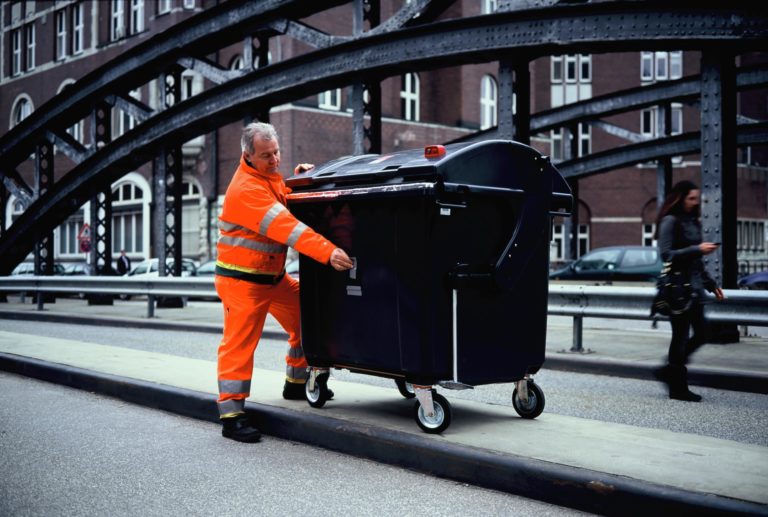
Garbageman Hans-Dieter Braatz is taking a picture with a large garbage container transformed into a pinhole camera. Image by Mirko Derpmann/Flickr (CC BY-NC-ND 2.0)..
All That Conspires to Help Us Thrive
The garbage truck hit the fire hydrant on our front sidewalk this week, and all of the sudden, on a Tuesday at 2 pm, in an otherwise ordinary sunshine-filled California day, there was a geyser on 42nd Street in Oakland.
All the neighbors came running from their houses to see what the sound was and their jaws dropped at the sight of the water shooting up past the top of our roof. People started taking pictures, of course. My husband, who fancies himself a sort of vigilante, called 9-1-1 and reported the accident/miracle. Firefighters came and tamped it down, and everyone looked around and smiled at one another in amazement.
This obviously wasn’t good for the environment, but it was good for the consciousness. It got me thinking about all that exists beyond our usual awareness, below the surface of a city, conspiring to make our lives possible.
There’s the tangible stuff: the sewer system and the electric poles and the street lamps. There’s also, believe it or not, the Internet tubes. Journalist Andrew Blum went in search of the physical Internet and wrote:
“For all the talk of the placelessness of our digital age, the Internet is as fixed in real, physical places as any railroad or telephone system ever was. In basest terms, it is made of pulses of light. Those pulses might seem miraculous, but they’re not magic. They are produced by powerful lasers contained in steel boxes housed mainly in unmarked buildings. The lasers exist. The boxes exist. The buildings exist. The Internet has a physical reality, an essential infrastructure, a ‘hard bottom,’ as Henry David Thoreau said of Walden Pond.”
Isn’t that mind-blowing? This thing that most of us experience as a sort of information ether, a fog, a signal, a noise, this thing that has transformed our lives so completely, exists somewhere real and functions because of hardware. It lives in buildings and boxes, is transported through lasers and light. When I read Andrew Blum’s words, it made me think about that oft-repeated fact that we’re all technically made of stardust. The world is far more fantastical than any fiction we could make up.
There are the people, also, that tirelessly make our lives work, most of whom get very little notice — the public transportation drivers and toll collectors, the park rangers and electric engineers, and of course, the sanitation workers. Did you know that collecting a city’s garbage is far more dangerous than policing it? Anthropologist Robin Nagle explains of sanitation workers:
“Their work, I think, is kind of liturgical. They’re on the streets every day, rhythmically. They wear a uniform in many cities. You know when to expect them. And their work lets us do our work. They are almost a form of reassurance. The flow that they maintain keeps us safe from ourselves, from our own dross, our cast-offs, and that flow must be maintained always no matter what.”
Imagine, for a moment, what the sanitation workers in your city know about the people that live there. Robin Nagle’s gorgeous book details the ethnographic discoveries that await them every time they lift the lid on a garbage can. While academics have texts to cite, sanitation workers have refuse. What we eat and drink and wear and let go of and break is a complex story about who we are; these men and women read it every week. And thank goodness they do. Otherwise we would all be knee deep in garbage.
And then there is the stuff and the people of your intimate sphere that make your life possible: the person that takes care of your child (thank you Koay!) or your aging parent, the neighbor who feeds and snuggles your cat while you are away (thank you Kate!), the friend who passes on clothes and wisdom and food (thank you Sarah!).
If you have a partner who shares your life and all the labor therein, you’ve got his or her often overlooked efforts to revel in, too; my John makes the most exquisite salads you’ve ever tasted with roasted almonds and parmesan flakes and melting blackberries, does all the laundry (I fold), and about ten million other kind, daily offerings. We have a practice in our marriage of saying thank you even for the most mundane of things: Thank you for taking the dishes out. Thank you for cleaning the litter box. Thank you for doing the taxes. It’s less about feeling beholden to someone and more of wanting to witness out loud. All the little chores can sometimes feel so invisible. It helps to know that someone sees your hands working and your mind plotting for their comfort.
Too often, I focus on what is broken — the slow line at the post office and my cell phone always on the fritz. I’d actually spent much of Saturday afternoon yelling at my printer. I anthropomorphized the thing: “How could it let me down like this? What nerve!” I thought as I restarted it again and again, growing angrier and angrier.
What nerve, indeed. What nerve to have the whole world basically conspire for your thriving and then lose your mind over one little thing not giving you exactly what you need in the exact moment that you demand it. Now that, my friends, is nerve. (And stupidity.)
I wish it didn’t take a geyser unexpectedly shooting into the sky to remind me to look below the surface, to see the invisible labors of lasers and love, to be deeply, totally grateful.
